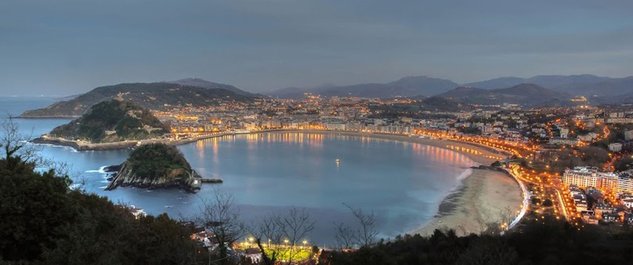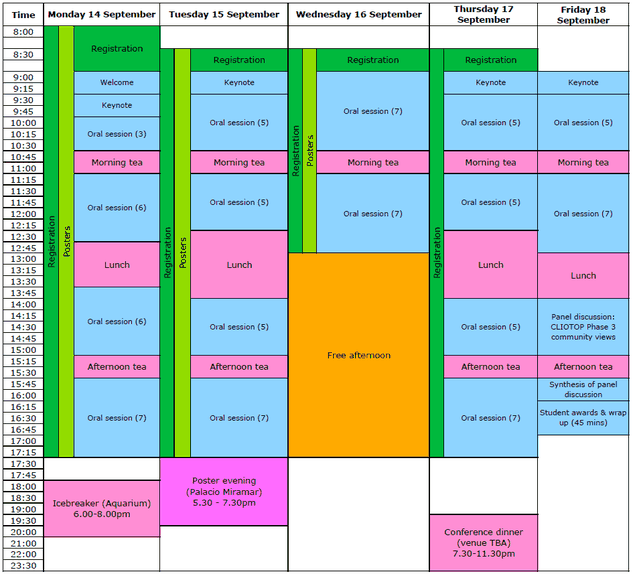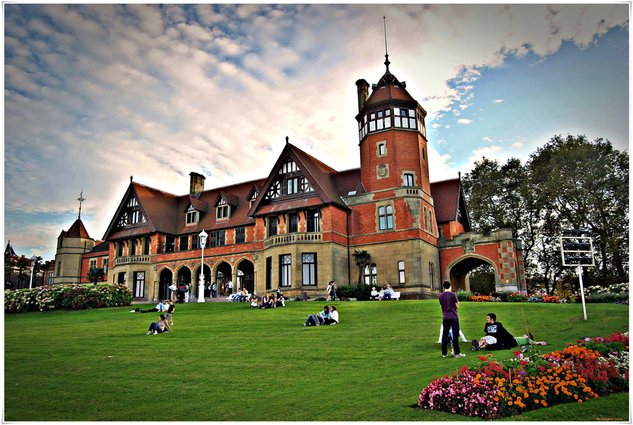
The 3rd CLIOTOP Symposium
Location: San Sebastián
Overall theme
Future of oceanic animals in a changing ocean
Objectives of the 3rd symposium
- Evaluate impacts of climate variability and change over seasonal to decadal time scales on pelagic species and dependent socio-economic and management systems
- Identify risk assessment and evaluation tools that incorporate climate variability in order to improve sustainable resource management (conservation, fisheries, spatial planning, etc.)
- Identify sustainable pathways for coupled socio-ecological oceanic systems
- Position CLIOTOP science for the next 10-year phase as part of Future Earth, and build a collaborating community of scientists, managers, and policy-makers.
Themes
- Early life history of pelagic species – winners and losers in the future ocean
- Implications of potential distribution and abundance shifts in oceanic organisms for food security and species conservation
- Trophic pathways in open ocean ecosystems - changes in mid-trophic level community composition as a result of changes to physical, chemical and biological components of the marine environment
- Integrated modelling to project and explore future patterns - evaluation of model complexity vs generality, evidence of important processes to include in models, and evaluation of model results
- Socio-economic aspects and management strategies – what are the key needs and resulting decisions and actions that should guide oceanic resource management under climate change
- Influence and role of biophysical processes and feedbacks on top predators
- Biodiversity, conservation and adaptive management – future strategies for incorporating long term change
- Scenarios of large marine organisms and their fisheries in a changing world
- Data, analyses and tool development associated with understanding the impacts of climate variability on fisheries
In all themes, submissions that take a comparative approach across taxa, regions, or temporal periods are encouraged.
Organizing committee
- Alistair Hobday (Australia)
- Haritz Arrizabalaga (Spain)
- Kevin Weng (USA)
- Karen Evans (Australia)
- Joel Llopiz (USA)
- Lisa Maddison (Norway)
- Dan Costa (USA)
- Elliot Hazen (USA)
Scientific committee
- Kevin Weng (USA)
- Alistair Hobday (Australia)
- Gorka Merino (Spain)
- Maria Gasalla (Brazil)
- Bob Cowen (USA)
- Patrick Lehodey (France)
- Osamu Abe (Japan)
- Olivier Maury (France)
Keynote speakers
Einar Svenson
Future information-needs to meet the ecosystem approach to marine research and management
IMBER/Institute of Marine Research
Abstract:
A major issue in marine ecology is how food webs are controlled or regulated by their environment and human interference. This obviously has important implications for the management of marine resources, whether the issue is harvesting these resources or protection of species. Globally, second and third trophic level carnivorous fish such as cod are over-fished, forcing fisheries in many parts of world to harvest at lower trophic levels. Moreover, the extreme variation in physical factors/ climate in northern waters, especially light, temperature, and ice cover, that occur over seasonal, inter-annual and longer time-scales, cause major fluctuations at all trophic levels of the food web. Thus there is no such thing as an “ecological balance” on these time-scales. A fundamental challenge in this context is to determine the interaction between large natural climate variations and expected change, and the impact of man, even if ecosystem processes still are rarely included in tactical fisheries management. Due to the complexity of this challenge, it can only be explored by an extensive use of mathematical models in combination with observations and laboratory studies, as also put forward in the new science plan of IMBER, including CLIOTOP and the new links to Future Earth.
Biography:
Einar Svendsen has 32 years research experience in physical oceanography, remote sensing and marine ecology in Arctic and sub-Arctic regions. He is particularly interested in the development and use of numerical ecosystem models to study the links between physics (climate) and lower trophic level biology and fish recruitment. He has published about 50 scientific peer-reviewed articles and taken part in 17 research cruises (several as chief scientist) in the Arctic, Antarctic and the northern seas. He recently finished a 6-year term as Research Director at the Norwegian Institute of Marine Research (IMR). For many years, he has been active in the scientific leadership of ICES (International Council of the Exploration of the Seas), particularly in activities related to the North Atlantic.
Jock Young
Trophodynamics of marine top predators: advances and challenges
Abstract:
The inaugural CLIOTOP meeting in Sete, France, in 2003 established 5 working groups, one of which was Working Group 3 (Trophodynamics of Ocean Top Predators). The problem that I and my co-chairs, Robert Olson and Frederic Menard, faced was that most “feeding studies” were regionally based. Broader comparisons within and between oceans relied mainly on subjective interpretations of the literature. Direct data comparisons, particularly between oceans, were to our knowledge, unavailable. Closer perusal of the literature showed also that there were different analytical and statistical methods in use. Our task was to engage with the researchers in this field to explore the potential of combining these data in a data set from which broader questions could be asked. For example, what were the effects of predicted global warming on the feeding ecology and more broadly, the food webs of top marine predators, particularly the tunas and billfish. With the support of CLIOTOP and the national agencies of the researchers involved, a series of workshops were run where we attempted to pool these data, both from direct feeding studies, and from biochemical approaches such as stable isotope analysis and more recently signature fatty acids. We then needed to apply statistical analyses that could account for the spatial and temporal variability of the resulting data. Our goal was to add a predictive component, so that we could provide, within measurable bounds, what the effects of warming waters was on the feeding ecology of these species. Here I summarize the advances made by the broader Working Group 3 community and suggest where future research could lead.
Biography:
Jock is a marine ecologist specializing in the food web relationships of top ocean predators and the biological oceanography of the waters they inhabit. He was part of the inaugural CLIOTOP meeting in Sete in 2004 and together with Bob Olson and Frederic Menard, has co-chaired CLIOTOP Working Group 3 (trophodynamics of marine top predators) till now. He is presently an Honorary Fellow at CSIRO Marine Labs in Hobart.
Lisa T. Ballance
Biography:
Lisa T. Ballance is the Director of the Marine Mammal and Turtle Research Division at the Southwest Fisheries Science Center of NOAA. In this role, she is responsible for setting the research priorities in accordance with division mandates for seven science programs and some 70 individuals.
Lisa has been with NOAA Fisheries since 1988, when she joined the agency as a Graduate Research Associate working on her Ph.D. Her research focused on community and physiological ecology of seabirds associated with yellowfin tuna and spotted and spinner dolphin schools in the eastern tropical Pacific. She obtained her doctoral degree from the University of California Los Angeles in 1993, and accepted a post-doctoral position the same year with the National Research Council, The National Academies, conducting research on comparative cetacean ecology in the eastern tropical Pacific and tropical Indian oceans. She became a marine ecologist with the Southwest Fisheries Science Center in 1996, Chief Scientist of the Eastern Tropical Pacific Cetacean and Ecosystem Research Program in 1999, and Leader of the Ecosystem Studies Program in 2001. In addition to her doctorate, she holds a Master of Science degree from Moss Landing Marine Laboratories (1987) and a Bachelor of Science degree from the University of California San Diego (1981). Her research has always included a strong ecological component and is heavily focused on cetaceans and seabird ecology in oceanic systems, ecological trends in space and time (at interannual to regime-shift scales), and ecosystem-based approaches to management.
Lisa is also a Professor at the Scripps Institution of Oceanography, Research Adviser with the National Academies, and Affiliate Professor at the University of San Diego. She is an editorial board member of Marine Ornithology, Past Chair of the Pacific Seabird Group, Elective Member of the American Ornithologists' Union, recipient of the Department of Commerce Silver and Bronze Medals and NOAA Fisheries Supervisor of the Year awards, and has been featured on the cover of the "Association for Women in Science" magazine. Her research has been supported by grants from NOAA, the National Science Foundation, National Geographic Society, World Wildlife Fund, and International Fund for Animal Welfare.
Draft program

Conference venue

The Symposium will be held at the Palacio Miramar on Concha Bay in the city of Donostia-San Sebastián, in the Basque Autonomous Community, Spain. This mansion was built by the royal family as a summer holiday home in about 1887. It has impressive views of the bay and Santa Clara Island. Miramar Palace is now owned by the city of Donostia-San Sebastián.
The city enjoys a privileged position in Europe. It is only 20km from the French border and less than 100km from the other Basque capitals, aristocratic Biarritz and Bilbao, with the famous Guggenheim Museum.
Getting to Donostia-San Sebastián:
By train: there are national and international rail connections.
By plane: The San Sebastián Airport (20 minutes from the city centre) has connections to Madrid and Barcelona. Bilbao Airport (100km from the city,) has connections to all of Europe, and Biarritz Airport (40km away) is served by French and international low-cost companies.
Registration and payment
Registration is now open: https://www.imr.no/conferences/CLIOTOP/
Registration fee:
|
Early registration |
Regular Registration (After 1 June 2015 |
|
| Scientists | 350.00 € | 400.00 € |
| Students | 250.00 € | 300.00 € |
Abstract preparation and submission
Abstracts are required for both oral and poster presentations. All abstracts are to be submitted via the Registration link. Refer to the important dates for details on the opening and closing dates of abstract submissions.
Once submitted, all abstracts will be assessed for their suitability and theme sessions considered. Refer to the theme sessions for details on their content. Once assessed, authors will be contacted individually to notify them of their acceptance.
An author may be the first author on only one abstract submission.
Abstract formatting
General instructions
Abstracts must be clearly and concisely written in good English. Authors whose native language is not English should consult someone fluent in English. Good writing improves the speed and effectiveness of review. The abstract should be typewritten in Times Roman, size 11 font with single spaced lines throughout the whole abstract. The only text that can be in italics are scientific names. Use capital letters only when the letters or words should appear in capitals. Please remove hyperlinks from email addresses and webpages included in the text. Please check symbols, abbreviations and technical terms for accuracy, consistency and readability. This will assist in the layout and formatting for the Program Handbook.
Content
Abstract content should be in the following order.
- Title: Use capital letters only when the letters or words should appear in capitals – do not capitalise the entire title. The title should clearly and concisely describe the abstract content and should be kept as short as possible.
- Authors: Authors should be listed in the order in which they are to appear at the head of presentation/poster. List each author, last name first followed by initials, using superscripts to identify multiple author addresses/affiliations. The lead author should be identified by an asterisk.
- Author addresses: each address should be listed on a separate line and superscripted to match to author´s names.
- Lead author contact email: list the lead author´s contact email. Remove any hyperlinks associated with the address.
- Abstract: The abstract should be a maximum of 300 words. Do not indent the first line of each paragraph of the abstract. Do not add graphics, tables, keywords or references.
- Presentation type: Poster/Oral/No preference.
An example abstract is shown here.
Accommodation
Block bookings have been made at several hotels in walking distance to Palacio Miramar. Please note the deadline for reservations in order to secure these reduced rates
OLARAIN STUDENTS´ RESIDENCE
In a quiet area close to Ondarreta beach
20-minute walk to the symposium venue (Palacio Miramar), or there is a public bus every 15 minutes.
Superior double room / night: 69,00 € + 10% VAT (breakfast included)
Double room, double occupancy / night: 63,64 € + 10% VAT (breakfast included)
Double room single occupancy / night: 58,00 € +10% VAT (breakfast included)
Single room / night: 50,00 € + 10% VAT (breakfast included)
FOR RESERVATIONS CONTACT: Javier Marin javiermarin@olarain.com
Telephone: (+34) 943 003300
Reservation code: CLIOTOP SYMPOSIUM
Deadline for reservations: 1 July 2015
HOTEL CODINA
Only 250m from Ondarreta Beach and the Palacio Miramar
Double room / night: 113,13 € (10% VAT and breakfast included)
Single room / night: 98,64 € (10% VAT and breakfast included)
FOR RESERVATIONS CONTACT: info@hotelcodina.es
Telephone: (+34) 943 212 200
Reservation code: CLIOTOP SYMPOSIUM
Deadline for reservations: 15 July 2015
Credit card number required for reservations
HOTEL NH ARANZAZU
Located in upmarket Ondarreta, close to the beach
15-minutes walk to Palacio Miramar
Double room / night: 152,00 € + 10% VAT (breakfast included)
Single room / night: 164,00 € + 10% VAT (breakfast included)
FOR RESERVATIONS CONTACT: nharanzazu@nh-hotels.com
Telephone: (+34) 94 3219077
Reservation code: CLIOTOP SYMPOSIUM
Deadline for reservations: 5 June 2015
HOTEL NIZA
Located right on the beach, the Hotel Niza is a 12-minute walk to Palacio Miramar
Double room / night: 191,00 € + 10% VAT (breakfast included)
Single room / night: 180,00 € +10% VAT (breakfast included)
FOR RESERVATIONS CONTACT: recepcion@hotelniza.com
Telephone: (+34) 943 42 66 63
Reservation code: CLIOTOP
Deadline for reservations: 1 June 2015
HOTEL ARRIZUL GROS
Located in Gros, the trendy San Sebastian.
25-minute walk to the venue, or a public bus leaves every 15 minutes
Double room/night: 107,10 € + 10% VAT (breakfast included)
Single room/night: 98,10 € + 10% VAT (breakfast included)
FOR RESERVATIONS CONTACT: info@hotelarrizulgros.com
Telephone: (+34) 943 32 70 26
Reservation code: CLIOTOP SYMPOSIUM
Deadline for reservations: 1 June 2015
HOTEL ARRIZUL CENTER
Located close to the Old Town on the beachfront.
25-minute walk to the venue, or a public bus leaves every 15 minutes
Double room/night: 125,10 € + 10% VAT (breakfast included)
Single room/night: 116,10 € + 10% VAT (breakfast included)
FOR RESERVATIONS CONTACT: info@arrizulhotel.com
Telephone: (+34) 943 32 28 04
Reservation code: CLIOTOP SYMPOSIUM
Deadline for reservations: 1 June 2015
ARRIZUL APARTMENTS
Luxury apartments located in the city center.
25-minute walk to the venue, or a public bus leaves every 15 minutes
1 bedroom Apartment (1-2 people)/night: 170,10 € + 10% VAT (breakfast included)
2 bedroom Apartment (1-2 people)/ night: 188,10 € + 10% VAT (breakfast included)
FOR RESERVATIONS CONTACT: info@hotelarrizulgros.com
Telephone: (+34) 943 32 70 26
Reservation code: CLIOTOP SYMPOSIUM
Deadline for reservations: 1 June 2015
For information about things to do and where to eat in San Sebastian, please see: http://www.sansebastianturismo.com/en/
Mentoring program
There will be a mentoring program as part of the CLIOTOP 3rd Symposium, where we will match more established scientists with students and early-career researchers working in a similar field. Mentors can give advice on research ideas, assist with fine-tuning conference presentations, and can help with networking within this community.
There will be a "lunch with the scientists", where two or three established scientists will be asked to have lunch at a table with some of the mentees to allow them to broaden their network a little more. You can sign up as a mentor or to be mentored at registration.

